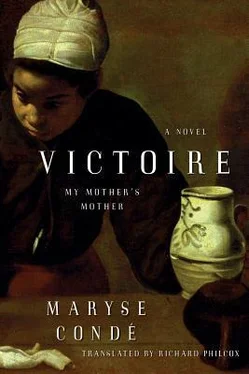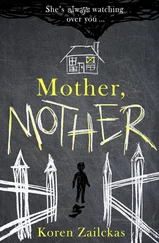The guests whirled around to the sound and rhythm of the waltzes from Paris performed by an orchestra that serenaded as best it could. At eleven forty-five it stopped playing. The dancers made a circle around Auguste and Jeanne. Auguste then made a speech. First of all he paid homage to his mother, who had not lived to see this day. Then he turned to his mother-in-law, who had fashioned the jewel of which he, the most fortunate of men, was taking possession. He made the mistake of using the same words to celebrate both women: valiant, feisty, belligerent, and pillars of society. The fabrication was obvious. Then the violinists played the habanera from Carmen :
L’amour est un oiseau rebelle,
Que nul ne peut apprivoiser,
Et c’est bien en vain qu’on l’appelle
S’il lui convient de refuser.
There was a storm of applause. A genuine ovation. Yet it was nothing but pure hypocrisy. Most of the guests knew the cards had been dealt wrongly, that Victoire in no way deserved such praise. However, more than Auguste’s lying hyperboles, it was the musical interlude that gave great displeasure. Was Jeanne Boucolon — it was surely her idea — in her right mind? To have Georges Bizet’s opera played for her mother, her illiterate and uneducated mother! Why not Johann Sebastian Bach? Who was she trying to delude? Everyone knew Jeanne. She always thought she was the cat’s whiskers. But this time, she had crossed the line.
Shortly after midnight, a car drove the couple to the rue de Condé. The rue de Condé is situated on the other side of the Place de la Victoire, and until the emergence of a black bourgeoisie, it defined the limits of the town’s habitable perimeter. In this emerging neighborhood Auguste owned a modest one-story house with a balcony and attic — nothing like the one he had built on the rue Alexandre Isaac shortly before I was born. He had lived there for ten years with his first wife, now deceased. The new couple settled in amid the debris of a first love.
At last, Auguste could savor Jeanne’s body, which he had lusted after so desperately. There was no griotte to hang out the wrappers stained with blood. But she was a virgin, that’s for sure. I don’t know what my mother thought of her wedding night or any of the following nights. What I do know is that I never heard her broach the subject of sex — which is unusual, even exceptional in our islands — without some measure of disgust.
One week later, it was Boniface’s turn at the wheel of his Cleveland to take Victoire to the rue de Condé. He loaded onto his shoulder like a porter the trunk containing her old clothes. In this quiet neighborhood the intrusion of the Cleveland produced the same effect as in Le Moule: people came out on their balconies or on their doorsteps to contemplate this high-powered car. They had much to be amazed about. What was this white Creole doing at the Boucolons? Who was this mulatto woman with him? Jeanne’s mother? She looked like a woman from Les Saintes. Did she come from Terre-de-Haut? From that moment on, the gossip began to rage.
The unfortunate Boniface had put time to his advantage. Night after night, he attempted to prove to Victoire the sanctity of their relations. Since she listened to him without saying a word, he did not know whether he had convinced her. In despair he was prepared to talk to Jeanne himself. He was not asking for much. Just so they would let him see his Victoire from time to time. But confronted with Jeanne’s impenetrable and contemptuous expression, he realized she would not listen to reason. So he kept silent and stumbled out of the house.
Jeanne had prepared for her mother the best room in the house: on the second floor, opening onto a balcony, since she did not want to relegate her to the attic under the roof like a servant. In order to climb into the four-poster bed à boules, you had to use a small pair of steps. The highlight of the furnishing was without doubt an oval cheval glass, surmounted by a decorative motif on an ornate frame, which gave a full-length reflection. The emotion and gratitude that such munificence could have caused Victoire was largely tempered by the conversation that followed. Jeanne calmly reiterated what she had already said in Le Moule. In the world she was entering, her association with a white Creole was unacceptable. Intolerable. No more commerce of the flesh or anything else. No mixing with company that might invite malicious gossip. Just as Caesar’s wife should be above suspicion, so the mother and mother-in-law of a Grand Nègre should be unassailable. The white Creoles were our enemies. They had subjugated and whipped their slaves for generations. They had only one desire at heart: humiliate the blacks by every means possible and reduce them to the level of animals.
Even if it had been said in Japanese, the effect of this short speech would have been the same. Victoire was incapable of understanding it. She did not know the meaning of the words “class” or “exploiters.” In her eyes, the Walbergs were not enemies: neither Anne-Marie nor Boniface. She didn’t dare say they were her friends. To use an out-of-date term that would have made Jeanne’s blood boil, they had always behaved like good masters.
I admit I have difficulty accepting the fact that Victoire relinquished Boniface so easily — her companion for twenty years who had given her pleasure, who had forgiven her infidelity, who had looked after her child, and who in a manner of speaking considered Victoire his only reason for living. I refuse, however, to accept the theory generally acknowledged by the inhabitants of La Pointe that since Victoire could get nothing more out of Boniface, she shamelessly turned her back on him. I believe that once again the fear instilled by her daughter got the upper hand. She could not envisage for one moment standing up to her at the risk of displeasing her. There is no doubt whatsoever the thought of Boniface tormented her, denying her sleep. I can see her at night with her eyes wide open in the dark, tossing and turning in her bed, thinking of her partner. I can imagine her in the midst of her daily routine suddenly gripped by his memory and obliged to stop for fear of bursting into tears.
Boniface never came back to the rue de Condé and Jeanne could claim that his relations with her mother were now over and done with. At Christmas and New Year’s he faithfully sent Victoire expensive presents, one of which was one of the first radio sets of the time.
I find it surprising that Jeanne never intervened likewise in the relations between her mother and Anne-Marie. She probably dreaded Anne-Marie, knowing her to be a loudmouth, capable of making terrible scenes. The fact remains, however, that Victoire and Anne-Marie continued to meet every day on the Place de la Victoire. To my knowledge, Boniface respected Jeanne’s instructions and never came to join them.
LIFE, THEREFORE, was organized without Boniface.
On the rue de Condé everything revolved around Jeanne’s teaching. She would get up at four in the morning, leaving Auguste lounging in bed. At that time, I don’t know why, she had given up daily mass, something she was to take up again only after Victoire died. She gave the final touches to her lessons and finished correcting the homework. Then she did an hour’s gymnastics in order to lose weight. Abdominals especially. Or else, dressed in one of her husband’s old pair of shorts, she would run as far as the harbor. Showing off her legs at her age was a bold step and the churchgoers coming home from first mass looked at her reproachfully. Her reputation for being odd started to be without precedent. Everything she did caused a sensation. What was this idea of running to lose weight? A woman should be proud to show off her curves, a sign that she is being spoiled at home.
Читать дальше












